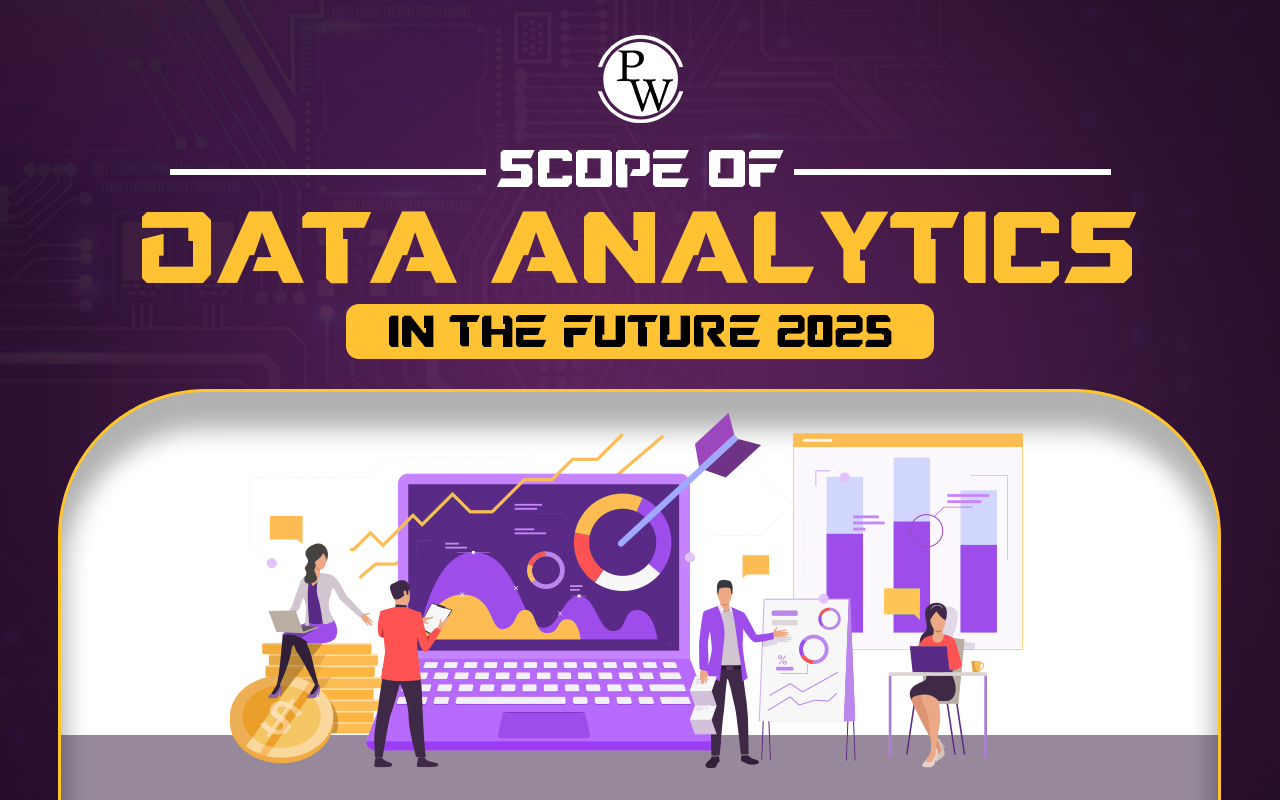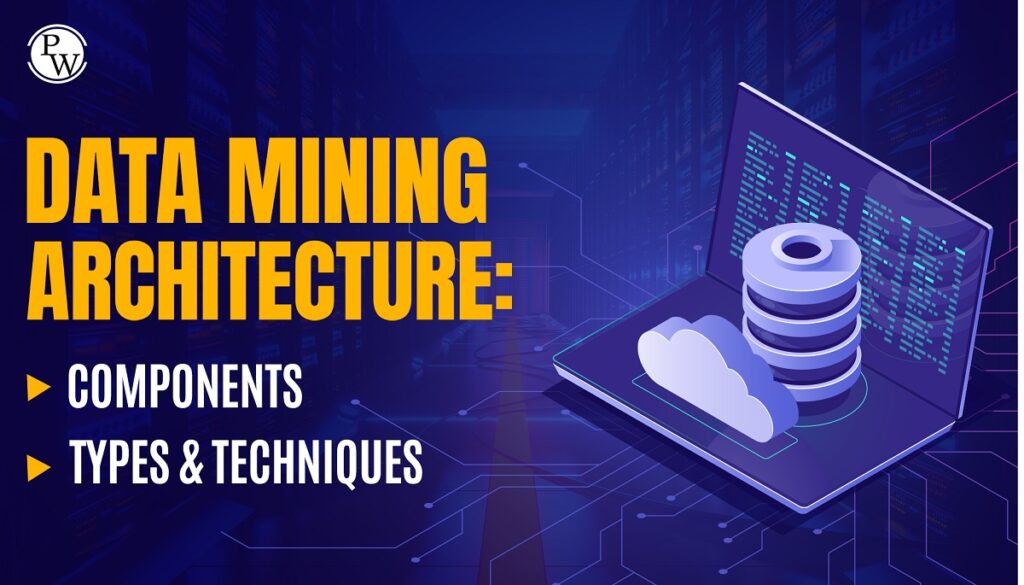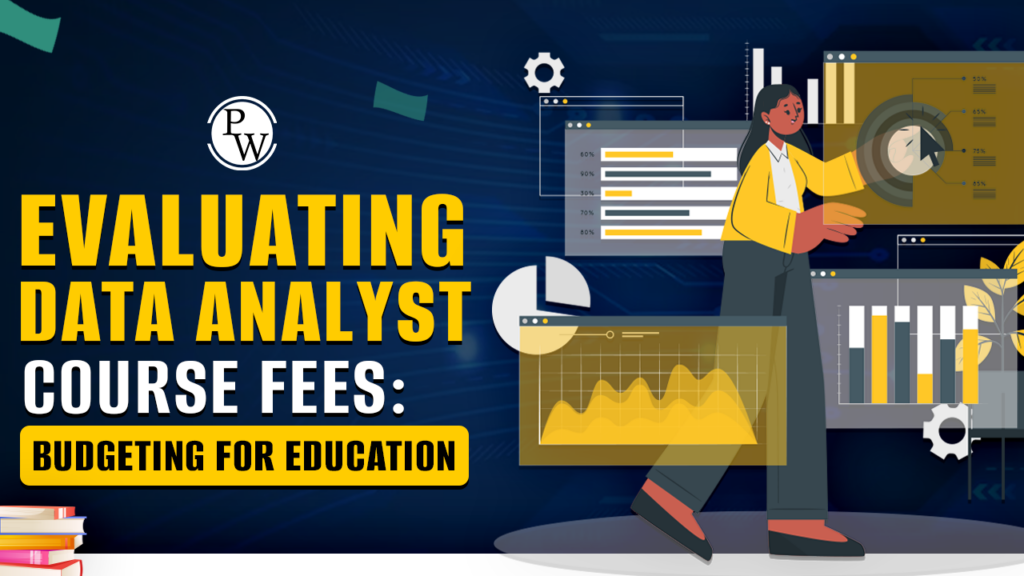Future of Data Analytics is sure to expand exponentially in the upcoming decade and beyond. Data Analysts will have more responsibilities such as analysis of human behavior, predicting trends through machine learning algorithms and leveraging interpretation techniques for better visualization.
Future of Data Analytics: Daily, a high volume of data is generated. Whether social media posts, online transactions, sensor readings, or healthcare records, data is the lifeblood fueling contemporary businesses and organizations.
What makes this even more intriguing is the projection that by 2025, an incredible 463 exabytes of data will be produced globally each day. To grasp the scale, picture 212,765,957 DVDs, each representing a day’s worth of data! Consider the impact of advanced technologies like AI, ML, edge computing, and IoT – these innovations are poised to transform the data analysis landscape, offering a prosperous future with exciting possibilities. As professionals in data analytics navigate this swiftly evolving terrain, it becomes imperative to adapt and cultivate new skills to stay pertinent.
Proficiency in handling intricate data sets, a profound comprehension of AI and machine learning algorithms, and staying abreast of cloud-based analytics platforms, data privacy regulations, and emerging data sources are indispensable. The good news is that detailed Data Science courses like Mastering Full Stack Data Analytics by Physics Wallah provide a path to move on this journey and progress within the field.
Future of Data Analytics Overview
As we move into an era of unprecedented data generation and digital transformation, the future of data analytics promises exciting developments and transformative impacts across various industries. The demand for real-time analytics will continue to grow. Organizations will increasingly rely on instant insights to make quick and informed decisions. This trend is particularly crucial in finance, healthcare, and e-commerce, where timely information is paramount.
As AI and machine learning models become more sophisticated, explainability will be increasingly emphasized. Understanding how AI arrives at specific conclusions or recommendations will be essential for building trust, meeting regulatory requirements, and ensuring the ethical use of AI in decision-making.
The future of data analytics holds immense potential for innovation and transformation. As technologies evolve and organizations embrace a data-centric mindset, the role of data analytics will continue to expand, driving strategic decision-making, operational efficiency, and competitiveness across diverse sectors.
What is Data Analytics?
Data analytics is the scientific process of examining raw data to derive meaningful conclusions and insights. Many of the methodologies and procedures involved in data analytics have been mechanized into automated processes and algorithms designed to interpret raw data for human understanding.
Key Takeaways:
- Data analytics involves analyzing raw data to draw conclusions and insights.
- It aids businesses in optimizing performance, operating more efficiently, maximizing profits, and making strategically informed decisions.
- The techniques and processes of data analytics are mechanized through algorithms for human comprehension.
- Approaches to data analytics encompass understanding what occurred (descriptive analytics), determining why it happened (diagnostic analytics), predicting future events (predictive analytics), and prescribing recommended actions (prescriptive analytics).
- Various software tools, including spreadsheets, data visualization applications, reporting tools, data mining programs, and open-source languages, play a crucial role in data analytics for comprehensive data manipulation.
Read more: What is Data Analysis?: Process, Types, Methods, and Techniques
Data Analytics Sectors
Here’s a table outlining different sectors where Data Analytics plays a crucial role:
| Sector | Role of Data Analytics |
| Healthcare | Predictive analytics for patient outcomes, personalized medicine, and resource optimization. |
| Finance | Fraud detection, risk management, customer segmentation, and investment analytics. |
| Retail | Customer behavior analysis, demand forecasting, inventory optimization, and personalized marketing. |
| Manufacturing | Predictive maintenance, supply chain optimization, quality control, and process optimization. |
| Telecommunications | Network optimization, customer churn prediction, and service quality improvement. |
| Energy and Utilities | Predictive maintenance for equipment, energy consumption optimization, and grid management. |
| Transportation and Logistics | Route optimization, predictive maintenance for vehicles, and supply chain analytics. |
| Education | Student performance analytics, personalized learning, and institutional efficiency improvement. |
| Government | Fraud detection, public health analytics, crime prediction, and resource allocation optimization. |
| E-commerce | Customer behavior analysis, recommendation systems, inventory management, and dynamic pricing. |
| Marketing and Advertising | Customer segmentation, campaign effectiveness analysis, and social media analytics. |
| Sports Analytics | Performance analysis, injury prediction, player recruitment, and fan engagement strategies. |
| Human Resources | Employee performance analysis, talent acquisition, workforce planning, and employee engagement analytics. |
| Real Estate | Market trend analysis, property valuation, risk assessment, and demand forecasting. |
| Agriculture | Crop yield prediction, soil health monitoring, supply chain optimization, and precision farming. |
| Pharmaceuticals and Life Sciences | Drug discovery optimization, clinical trial analysis, and personalized medicine development. |
Future Of Data Analytics In India
India is poised for a transformative journey in data analytics, with substantial growth and exciting opportunities. The country’s expanding scope of data analytics is intricately linked to the surge in internet users, providing a solid foundation for future developments.
1. Industry Growth and Projections:
Over the past decade, India has witnessed a remarkable expansion in data analytics. The industry’s growth is fueled by the country’s ever-increasing number of internet users. Projections indicate that by 2026, the Indian Data Analytics industry is set to reach a staggering $118.7 billion. This substantial growth suggests data analytics’s crucial role in shaping various sectors of the Indian economy.
2. Startups and Big Data:
Startups in India actively embrace the potential of Big Data, signaling a robust future for data analytics. These innovative enterprises recognize the value of harnessing large datasets to derive meaningful insights, enhance decision-making processes, and drive business success. The integration of Big Data analytics is a testament to the adaptability and forward-thinking nature of the Indian startup ecosystem.
3. Job Opportunities and Career Advancement:
The surge in the data analytics industry is translating into many job opportunities. As organizations recognize the strategic importance of data-driven decision-making, professionals in the field are becoming increasingly sought after. Data analytics is a pivotal domain for career advancement in India, offering a dynamic landscape for individuals with the right skills and expertise.
4. Technology Adoption and Innovation:
The future of data analytics in India is intricately linked to technology adoption and continuous innovation. The data analytics landscape will evolve as businesses embrace advanced analytics tools, machine learning, and artificial intelligence. This technological evolution enhances data analytics capabilities and opens up new avenues for solving complex problems and driving innovation across industries.
5. Data-Driven Decision-Making:
The future will witness a cultural shift towards data-driven decision-making in Indian businesses. Organizations increasingly rely on data analytics to inform strategic choices, optimize operations, and gain a competitive edge. This shift reflects a broader acknowledgment of the transformative power of data in steering businesses toward success.
7. Educational Initiatives and Skill Development:
Recognizing the growing demand for skilled professionals in data analytics, there is a parallel emphasis on educational initiatives and skill development. Institutions and training programs are gearing up to equip individuals with the necessary knowledge and expertise to thrive in the evolving data analytics landscape.
The future of data analytics in India unfolds as a growth, innovation, and transformative impact. The landscape promises a dynamic journey from industry projections to the increasing adoption of advanced technologies, making data analytics a cornerstone of India’s technological evolution and economic progress. As the nation embraces the data-driven era, the opportunities and possibilities for individuals and organizations in data analytics are promising and expansive.
Also Check: Artificial Intelligence and Machine Learning Job Trends in 2023
Future Of Data Analytics 2025 – Top 15 Trends In Data Analytics
As we approach 2025, the data analytics landscape is poised for significant transformations. The field, already a powerhouse in driving insights and informed decision-making, is set to evolve with emerging trends that promise to reshape industries and redefine data-driven strategies. Here are the top trends that will shape the future of data analytics in 2025:
1. AI-Powered Analytics:
Artificial Intelligence (AI) will take center stage in data analytics, revolutionizing how organizations derive insights from data. Machine learning algorithms will become more sophisticated, enabling predictive analytics, automated decision-making, and the ability to uncover intricate patterns within massive datasets.
2. Edge Computing for Real-Time Analytics:
The proliferation of edge computing will bring data analytics closer to the source of data generation. This shift towards decentralized processing will enable real-time analytics, especially critical in applications like the Internet of Things (IoT) and autonomous systems.
3. Blockchain Integration:
With the increasing importance of data security, blockchain technology will find applications in data analytics. Blockchain’s decentralized and immutable nature will enhance data integrity and security, addressing data tampering and unauthorized access concerns.
4. Exponential Growth of Unstructured Data Analytics:
Unstructured data will grow exponentially, including images, videos, and text. Advanced analytics tools will evolve to effectively process and derive insights from unstructured data, unlocking new dimensions of information for decision-makers.
5. Augmented Analytics:
Augmented analytics, combining machine learning and natural language processing, will make data insights more accessible to non-technical users. This democratization of analytics will empower individuals across organizations to make data-driven decisions without requiring specialized skills.
6. Quantum Computing Impact:
The advent of quantum computing will bring unprecedented computing power to data analytics. Quantum algorithms will tackle complex problems at speeds unimaginable with classical computers, opening new frontiers in data analysis, optimization, and cryptography.
7. Focus on Data Privacy and Ethics:
With increasing concerns about data privacy, there will be a heightened focus on ethical data practices. Organizations will prioritize transparent data collection, storage, and usage, aligning with evolving regulations and building user trust.
8. Continuous Intelligence:
Continuous intelligence will become a standard in analytics, emphasizing real-time insights and actionability. Organizations will transition from traditional batch processing to a constant flow of analytics, ensuring decision-makers can access the most up-to-date information.
9. Personalized and Contextual Insights:
Data analytics will move towards delivering personalized and contextual insights. AI-driven analytics engines will understand user preferences and provide tailored recommendations and insights based on specific contexts.
10. Explainable AI for Transparent Decision-Making:
As AI models become more complex, there will be a growing need for explainable AI. Organizations will prioritize models that clearly explain their decisions, especially in industries where transparency and accountability are critical, such as healthcare and finance.
11. Collaborative Analytics and Data Sharing:
Collaborative analytics platforms will facilitate seamless data sharing and collaboration among teams. This trend is particularly relevant in a remote work environment, where teams must work together on real-time analytics projects, regardless of geographical location.
12. Automated Data Governance and Compliance:
As data privacy regulations become more stringent, automated data governance and compliance tools will gain prominence. These tools will help organizations manage data access, ensure compliance with regulations like GDPR, and implement robust data governance practices.
13. Focus on Responsible AI and Ethical Data Use:
With the increasing influence of AI in decision-making, there will be a heightened focus on responsible AI and ethical data use. Organizations will prioritize ethical considerations, fairness, and accountability when deploying AI models to avoid unintended biases and consequences.
14. Hybrid and Multi-Cloud Analytics:
The future will witness a shift towards hybrid and multi-cloud analytics environments. Organizations will leverage a combination of on-premises, public cloud, and private cloud infrastructure to meet their specific analytics needs, ensuring flexibility and scalability.
15. Human-Machine Collaboration:
The future of data analytics will witness increased collaboration between humans and machines. While AI algorithms will handle complex computations, human intuition and creativity will remain invaluable in interpreting results, asking the right questions, and defining strategic objectives.
The future of data analytics in 2025 promises a landscape enriched with technological advancements, ethical considerations, and a deeper integration of analytics into various facets of business and everyday life. The evolution of AI, edge computing, and quantum computing, coupled with a steadfast commitment to privacy and ethics, will define the trajectory of data analytics, making it an indispensable force in shaping our data-driven future.
For those interested in taking a first step towards making a career transition or advancing one’s understanding of data analytics, Mastering Full Stack Data Analytics by Physics Wallah provides just that opportunity: a chance to be prepared for the upcoming world of analytics that is so rapidly transforming our global economy and data landscape. So start your journey today with this course and become an industry leader by 2025!
Future Of Data Analytics With AI
As we peer into the future, the convergence of Data Analytics and Artificial Intelligence (AI) emerges as a transformative force, reshaping industries and redefining the possibilities of intelligent decision-making. Here’s a glimpse into the synergistic future of Data Analytics with AI:
| Aspect | Description |
| Enhanced Predictive Analytics | AI-powered algorithms evolve for real-time adaptation, enhancing accuracy in forecasting future trends. |
| Autonomous Decision-Making | Integration of AI empowers systems to make autonomous decisions, optimizing operational efficiency. |
| Natural Language Processing (NLP) | NLP facilitates human-like interactions with AI-driven systems, making analytics accessible to a broader audience. |
| Cognitive Analytics for Unstructured Data | AI excels in handling unstructured data, extracting meaningful insights from images, videos, and textual information. |
| AI-Driven Personalization | AI tailors recommendations, services, and interactions based on individual preferences, creating hyper-personalized experiences. |
| Reinforcement Learning in Analytics | AI systems optimize decision-making through reinforcement learning, refining strategies based on trial and error. |
| Advanced Anomaly Detection | AI algorithms swiftly identify deviations in data, enabling early detection of irregularities and potential issues. |
| Human-AI Collaboration in Analytics | Increased collaboration between humans and AI, leveraging AI for processing vast datasets while humans provide intuition and creativity. |
| Explainable AI in Analytics | Ensuring transparency and understandability in AI decision-making processes for user and stakeholder trust. |
| AI-Powered Data Governance | AI contributes to robust data governance practices, assisting in data quality management, compliance monitoring, and ethical use of data. |
Why Data Analytics is the Future Of Everything
Here are some reasons why data analytics is considered the future across various domains:
1) Informed Decision-Making:
Data analytics empowers organizations to make informed decisions based on evidence and insights derived from extensive data. It mitigates guesswork and allows for strategic planning grounded in real-world observations.
2) Operational Efficiency:
The implementation of data analytics optimizes operational processes. By analyzing patterns and trends, organizations can identify areas for improvement, streamline workflows, and enhance overall efficiency.
3) Competitive Edge:
Businesses that harness the power of data analytics gain a competitive edge. Through market analysis, customer behavior insights, and trend forecasting, companies can stay ahead of the competition and adapt to changing landscapes.
4) Urban Planning and Smart Cities:
Data analytics plays a pivotal role in urban planning, contributing to the development of smart cities. It helps optimize traffic flow, manage resources efficiently, and enhance urban living experiences.
5) Scientific Discovery:
In scientific research, data analytics accelerates discovery by processing vast datasets. From genomics to environmental studies, data analytics aids researchers in uncovering patterns and deriving meaningful conclusions.
6) Cybersecurity:
Data analytics becomes indispensable in identifying and preventing security breaches as cyber threats evolve. Analyzing network behavior and anomalies helps enhance cybersecurity measures.
7) Financial Planning and Risk Management:
Data analytics is crucial for risk management, fraud detection, and investment strategies in the financial sector. It enables financial institutions to make informed decisions and respond swiftly to market changes.
8) Environmental Sustainability:
Data analytics contributes to environmental sustainability efforts by monitoring and optimizing resource usage. It aids in identifying eco-friendly practices and reducing the ecological footprint of businesses and industries.
9) Human Resources and Talent Management:
In HR, data analytics assists in talent acquisition, employee engagement, and workforce planning. It enables organizations to understand employee needs, improve workplace satisfaction, and optimize team structures. Now that we’ve taken a close look at the scope and future of data analytics in 2025 and beyond, it has become evident how important data science will be for our daily lives. We must arm ourselves with the skills necessary to understand the use, value, and capabilities of advanced data analytics which numerical models offer. Decode Data Science with Machine Learning 1.0 by Physics Wallah is an excellent course to start when it comes to learning more about this exciting field.
Also Read: Best Data Analytics Certification Programs for Career Advancement
Benefits of Data Analytics
Data analytics offers a myriad of benefits across various domains, driving informed decision-making and fostering innovation. Here are some key benefits:
- Enhanced Customer Experiences: Understanding customer preferences, behaviors, and feedback is critical for delivering personalized experiences. Data analytics enables businesses to tailor products and services, improving customer satisfaction and loyalty.
- Innovation and Product Development: Analyzing market trends and consumer needs aids in the development of innovative products and services. By leveraging data, organizations can stay ahead of industry changes and create offerings that resonate with their target audience.
- Risk Management: In sectors like finance and insurance, data analytics plays a vital role in risk assessment and management. By analyzing historical data and market trends, organizations can make informed decisions to mitigate risks and enhance overall financial stability.
- Healthcare Advancements: In healthcare, data analytics contributes to medical research, personalized treatment plans, and predictive analytics for disease prevention. It enhances patient care, accelerates drug discovery, and improves overall healthcare outcomes.
- Cybersecurity: Data analytics is crucial for identifying and preventing security breaches in the digital landscape. By analyzing patterns and anomalies in network behavior, organizations can strengthen their cybersecurity measures and respond proactively to evolving threats.
- Smart Cities and Urban Planning: Data analytics plays a pivotal role in optimizing city infrastructure, managing resources efficiently, and improving overall urban living experiences. It contributes to the development of smart cities by providing insights for sustainable and efficient urban planning.
- Education and Workforce Planning: In education, data analytics provides insights into student performance, learning trends, and areas that may require additional focus. In human resources, it assists in talent acquisition, employee engagement, and workforce planning, facilitating data-driven decision-making for educators and organizations.
- Continuous Improvement: Through the continuous analysis of data, organizations can identify areas for improvement and innovation. This iterative process ensures that businesses evolve, adapt to changing circumstances, and remain competitive in dynamic markets.
- Healthcare and Scientific Research: In healthcare, data analytics contributes to patient care, disease prediction, and medical research. It aids in identifying effective treatments, optimizing healthcare operations, and improving overall health outcomes.
- Supply Chain Optimization: Data analytics is instrumental in optimizing supply chain management. It helps in demand forecasting, inventory management, and logistics planning, ensuring a streamlined and efficient supply chain.
Overall, data analytics is a transformative force that empowers organizations to harness the full potential of their data, driving success and innovation across diverse industries.
Taking a course from Mastering Full Stack Data Analytics by Physics Wallah is a great place to start this journey. They provide a comprehensive curriculum covering the latest trends in data science, AI & ML programming as well as unique insights into how deep learning can be used to develop sophisticated predictive models with minimal effort. With access to industry experts that understand the nuances of the data science landscape, you can master both sides of full stack analytics quickly and effectively. So don’t wait; take up this excellent learning opportunity today and stay ahead of the curve!
FAQs
What role does data analytics play in smart cities and urban planning?
Data analytics is pivotal in optimizing traffic flow, managing resources efficiently, and enhancing urban living experiences. It contributes to the development of smart cities by providing insights for sustainable and efficient urban planning.
How does data analytics benefit cybersecurity?
Data analytics is indispensable in cybersecurity for identifying and preventing security breaches. Analyzing network behavior and anomalies helps enhance cybersecurity measures, ensuring the detection and mitigation of evolving cyber threats.
What impact does data analytics have on personalized customer experiences?
Data analytics enables businesses to deliver personalized customer experiences by understanding preferences and behaviors. Companies can tailor their offerings through market analysis and trend forecasting, leading to higher customer satisfaction and loyalty.
How does data analytics contribute to environmental sustainability?
Data analytics contributes to environmental sustainability by monitoring and optimizing resource usage. It aids in identifying eco-friendly practices, reducing environmental impact, and promoting sustainable practices across industries.
In what ways does data analytics influence financial planning and risk management?
Data analytics is crucial for risk management, fraud detection, and investment strategies in the financial sector. It enables financial institutions to make informed decisions, respond to market changes, and enhance overall financial planning.
How does data analytics impact education and workforce planning?
In education, data analytics provides valuable insights into student performance, learning trends, and areas that may require additional focus. In HR, it assists in talent acquisition, employee engagement, and workforce planning, facilitating data-driven decision-making for educators and organizations.





